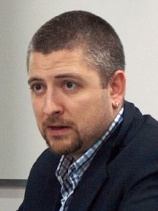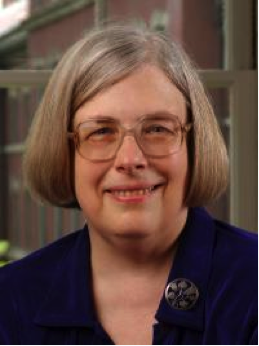by Katherine Sobering
 At a well-attended talk sponsored by the Urban Ethnography Lab, Dennis Rodgers, a professor of Urban Social and Political Research at the University of Glasgow discussed his paper, “From ‘broder’ to ‘don’: Methodological reflections on longitudinal gang research in Nicaragua, 1996-2014.”
At a well-attended talk sponsored by the Urban Ethnography Lab, Dennis Rodgers, a professor of Urban Social and Political Research at the University of Glasgow discussed his paper, “From ‘broder’ to ‘don’: Methodological reflections on longitudinal gang research in Nicaragua, 1996-2014.”
Over lunch, Professor Rodgers reflected on the academic career that began with his dissertation research in Nicaragua in the 1990s. Since this initial period of research, Professor Rodgers has returned to the specific barrio of his dissertation fieldwork seven times. And he plans to continue going back.
As his dissertation evolved into a long-term research project, Professor Rodgers conceived of it as longitudinal ethnography. By this, he refers to immersive ethnographic fieldwork conducted diachronically over an extended period of time, or through appropriately timed revisits (Burawoy 2003; Firth 1959).
But what are the implications of such on-going ethnographic research? How can we make sense of ethnographic “revisits”? And what are some of the pitfalls that may result?
Certainly one of the greatest benefits of ethnographic research is to observe dynamic social processes as they occur over time. As Professor Rodgers pointed out, he has more or less witnessed a cycle of cultural transformation through the institutional evolution of a gang in Nicaragua.
Yet the specific challenges that arise from such an endeavor are many. First, the notion of “the field” as a spatially and temporally bounded location is increasingly misleading. Professor Rodgers (and many of the event’s attendees) stay in regular contact with individuals in “the field”. Social media further complicates this artificial division.
Over the course of a lively discussion informed by many different experiences conducting ethnographic research, we critically examined the idea of a “revisit.” If “the field” is no longer a bounded place, where do you go? To the original site of study? Or do you trace the network of people you once knew? Or follow a particular trend or social phenomena?
Moreover, “the field”—may it be sites, people, or networks—changes over time. But this is not unidirectional. As ethnographers, we also change. We age. We read more. We go through life changes that may provide different perspectives on the same event. And all of this affects how we do ethnography.
Professor Rodgers clearly describes such changes in his own career. Almost ten years ago, he conducted mostly participant observation in the barrio, and was even inducted into the gang he studied (Rodgers 2007).
Today, he is treated as a respected elder (a “don”). His methodological tools increasingly rely on interviews and informal conversations with long-term informants.
The form and function of ethnographic research is changing. In his paper, Professor Rodgers understands his return visits as “serendipitous time lapse(s).” Yet it seems to me that these ethnographic revisits are institutionally structured by his academic career trajectory as well as access to funding.
Structural changes in both funding and time-to-degree requirements affect the way ethnographic research is produced. For many graduate students, multiple periods of “pre-dissertation” fieldwork pave the way for a prolonged period of dissertation-worthy immersion
Examples abound in our department alone. Marcos Pérez conducted three summers of ethnographic research with piquetero groups in Argentina before returning for a year of dissertation fieldwork. Katie Jensen has studied asylum seekers in Brazil for three summers, and is now preparing for an extended period of dissertation research. And I conducted my first period of fieldwork in Argentine worker-recovered businesses as an undergraduate in 2008, having since spent a total of nine months in the field prior to my dissertation research.
Professor Rodgers did well to remind us: “Research is by its very nature imperfect and limited, and this not only in terms of ‘’the data’, but also ‘the method’, ‘the researcher’, and ‘the context’”. Indeed, grappling with the notion of longitudinal ethnography spurred many of us to think critically about how the pattern of our fieldwork shapes what data we collect, the topics we analyze and ultimately how we interpret our findings.
References:
Burawoy, M., (2003), “Revisits: An outline of a theory of reflexive ethnography”, American Sociological Review, 68(5): 645-79.
Firth, R., (1959), Social Change in Tikopia: Re-study of a Polynesian Community after a Generation, London: George Allen & Unwin.
Rodgers, D., (2007), “Joining the gang and becoming a broder: The violence of ethnography in contemporary Nicaragua”, Bulletin of Latin American Research, 27(4): 444-61.
Rodgers, D., (Forthcoming), “From ‘broder’ to ‘don’: Methodological reflections on longitudinal gang research in Nicaragua, 1996-2014.”

